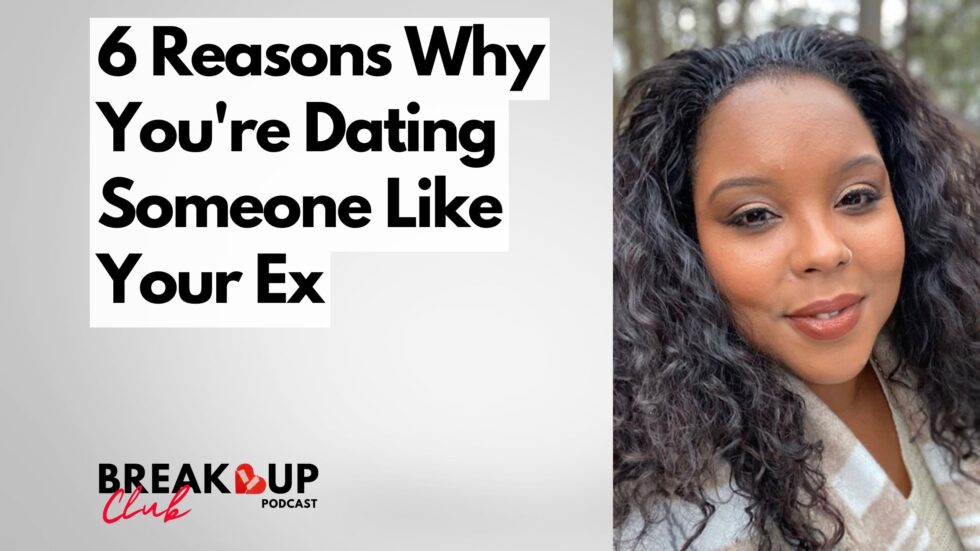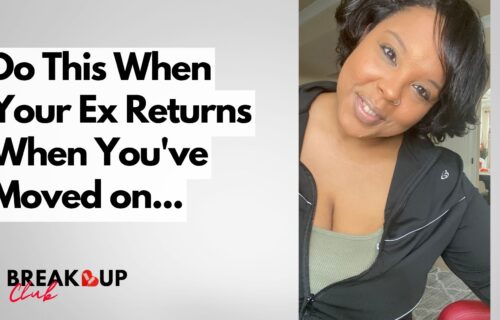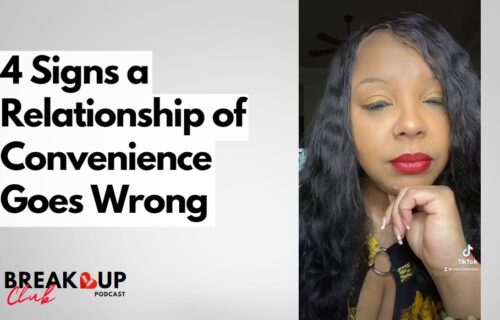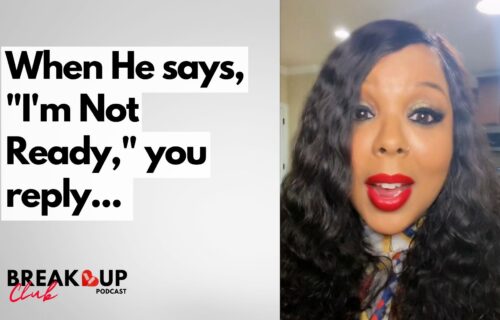
6 Reasons Why You’re Dating Someone Like Your Ex
When we experience a few challenging or short-lived relationships, we try to avoid the type of people we know are wrong for us. However, we still subconsciously attract those we know aren’t good for us.
Why? From our parents to our ex have left an “imprint that we may not be fully aware of.” We will discuss the attachment styles and relationship patterns that keep us creating relationships with the same type of person, like your ex.
In today’s episode, I will discuss the six reasons why you may be dating someone like your ex.
But psychology and science tell us why we’re still attracting the same ex in different bodies.
1. You’re comfortable with what seems similar
Here’s an analogy. If you’re kissing all these frogs who don’t turn into a prince, those frogs have something in common – those frogs are attracting the same princess.
You like people who are similar or have something in common. You may think you had much in common with your ex, but that may be untrue.
There are perceived similarities and actual similarities. You perceived that you and your ex were so much alike, but you weren’t on the same wavelength when you got together.
I’m sure you had so much fun while dating your ex, “OMG! You’re so much fun. I like you.” But, when you get to know each other, you start to filter out everything you dislike about that person.
For example, let’s say you meet your ex at a concert. You both enjoy going to concerts and like the same artist. You start to feel comfortable, positive, and confident in giving this person more of your time. Now, you want each other.
After getting involved in a romantic relationship, you discover they have ways you don’t like about themselves. They may be rude to the restaurant’s waiter/waitress, dislike kids, can’t stand cats, or have bad credit. They hid their addictions, stopped taking their medications, and ate fried food daily with a cloaked heart, childhood issues, secrets, lovers, or families on the other side of the country.
Just because we like someone and have something in common doesn’t mean they are the right match for a relationship with you. If you’re head over heels for someone, have patience and spend more time with them before you take it to the next level.
As a side note: Also, having too much similarity in a relationship can make partners unable to grow and develop.
2. Your attachment styles
Psychologists say our love interest has similar traits to our parents. Our attachment style, which developed from childhood, may impact the type of partner we have drawn to.
There are three main attachment styles: secure, anxious, and avoidant. Avoidant is broken down into two subcategories: fearful and dismissive.
A secure attachment is when someone is confident and self-assured in their relationship. They can be in a relationship without always being around their partner.
The anxious ones want to be close and intimate with their partner. They are known to be needy, clingy, smothering, and overanalyzing the relationship. They over-communicate over text messages because they worry about their partner pulling away.
The avoidant suppresses their emotions to avoid emotional vulnerability, reframes from emotional closeness, and is known to be standoffish. The avoidant is broken down into two subcategories. Dismissive-avoidant and fearful-avoidant.
Dismissive avoidants are distanced and value their own space over connections. They get nervous when their partner gets too close to them.
Fearful avoidants are afraid of getting hurt. They crave love and connection but are sensitive to rejection and fear abandonment.
Someone with an anxious attachment style would more likely attract an avoidant because it fed their anxiety when they pushed away. The avoidant will attract an anxious who doesn’t feel safe and run from those who are secure or feel it is too good for them. The friends-with-benefits relationship fits well with an avoidant.
Here’s a dialogue between an anxious-avoidant attachment style:
Anxious: We have been dating for four months. I’m ready for a commitment. Where is this relationship going?
Avoidant Thinking. “We’re back on this. It’s only been four months. Commitment today, marriage tomorrow. She will smother me, and I won’t have my space. What if she asks for my passwords? I don’t think I can do this.”
The avoidant doesn’t speak his mind; they hold their emotions inside by changing the subject matter.
“Baby, please don’t spoil the night. We were having a great time.”
The anxious doesn’t hear back from the avoidant until days or weeks later. When he returns, he acts as if nothing happened. “Hey, sexy.”
Avoidant usually initiates the breakup.
Let’s switch gender roles.
Avoidant: “Baby, I’m tired. The girls and I were out all night, and my phone died, and I couldn’t find my charger. But I’m home. Why are you tripping?”
Anxious: “Really?! It’s midnight. You must have been drinking that you didn’t even notice I called four times and left six messages. I don’t trust that Keisha girl you’ve been hanging out with. Are you seeing someone else?”
Avoidant: “Baby, Okay. It would be best if you made more sense. You know I love you. And I’m tired, and I’m going to bed. We can talk about this in the morning.”
Six months later, the avoidant wants a divorce cause the is anxious, clingy, and doesn’t trust their partner.
3. How we attach is how we break up
Relationship attachment style can affect your breakup style, regardless of whether you are prone to an anxious or avoidant response.
In the first scenario, I mentioned that the avoidant initiated the breakup. But an anxious attachment style can make the breakup the hardest.
People with high attachment anxiety are co-dependent on their romantic relationships; after the breakup, they lack support from friends and family. If anxious have low self-esteem, they will try to get back with their ex.
However, an anxious are more likely to move on from a past relationship quicker than an avoidant. They are afraid of being alone and seek love and emotional connections.
The avoidant will pretend they don’t care after a breakup and rationalize why the relationship didn’t work. “It wasn’t going to work out anyway. He/she was terrible with money.” Or “they didn’t have real goals and just settled with their measly pay.”
But the feelings would eventually catch up to them.
The goal for my listeners and group members is to experience a secure attachment style that is low in anxiety and avoidance but balances their emotional attachment to others and themselves.
I don’t think a secure attacher had a perfect childhood upbringing. They have also experienced addiction, had childhood issues that lingered until adulthood, and came from family addictions or dysfunctions, but they can assess their lives objectively.
Secure attachment went through their healing to overcome their fear of abandonment or intimacy. They connect with what they have and appreciate it.
You can have a secure relationship by talking to a friend, reading personal development books, implementing the practices, or talking to a therapist.
4. You have an unconscious relationship pattern
We have patterns from how we dress to the food we eat to the side of the bed we sleep in. Relationship patterns are repetitive behaviors with new people in their life. The patterns are who we pick, how we interact, and how we allow them to treat us. Some can be good, and others can be bad.
We all have types when it comes to dating. These types can be physical appearance, qualities, or economic or social status. Most women are attracted to a financially stable, good-looking man who drives a luxury car or is part of a high-profile group. Some man’s type could be a woman who’s confident, feminine, and submissive with a phat booty. The list goes on.
Let’s talk about who you pick. Let’s say your type is a man who to extremely attractive sexy body man beats it up in bed, but he’s never at home, constantly traveling, and may probably cheat.
Or, you are always attracted to exotic-looking, banging bodies, women who don’t want to cook, clean, or work. She may be unsupportive of your goals unless you make more money. She’s not concerned about your passion but passionate about spending your money.
Let’s talk about how you treat your partner.
The caregiver: Do we always try to fix, take care of, or improve our partner?
The alpha: Do you always want to take control or be in charge in the relationship?
The parent: Do you nag your partner? Do this, do that, pay this bill, clean the garage.
The co-dependent: Do you put in so much effort to please your partner you don’t want competition? You don’t want them to spend time with family and friends.
The push-pull: Do you want to get serious too quickly that your partner pulls away?
It would help if you reflected on your ex’s relationship patterns and personality traits that contributed to your unhappiness. You must identify the patterns, break the mold and build new healthy habits. So, when you jump back into the dating scene, and someone makes you anxious or insecure in the relationship, and you’re not happy, that can be a clue that you’re dating someone just like your ex.
5. Like attracts likes and opposites attract
Quantum physics tells us, “Like attracts like” Here’s how energy works. For two magnets to attract, the magnetic fields must be equal. One magnet’s north pole must attract the other’s south pole, which means we attract both the opposite and equivalent of who we are.
For example, two people with an abusive past will gravitate towards each other – “like attracts like”. An abuser may not attract another abuser; instead, they attract someone who will tolerate the abuse. They both resonate with fear that feeds insecurity issues “like attracts like.” However, these two coping mechanisms are the opposite. The abuser hides their fear behind an exaggerated sense of self-worth. “I’m superior to you.” The abusee takes the feelings of weakness.
On the flip side, people who are positive, secure, giving, and kind to themselves and others will repel people who are needy, negative, attention seekers, or closed off emotionally.
While no one consciously seeks out someone who’s negative or has toxic behaviors, you attract someone who is vibrating at the same frequency. So, if you’re in a state of mind when you draw a bad match, you will keep repeating the same choices until you learn how to take emotional responsibility and work on yourself.
6. Jumps into a new romantic relationship too fast
Remember I’ve discussed that we gravitate toward people we are similar or familiar with? When we start a new romantic relationship, before healing, we try to heal the wounds of the past relationship psychologically with the new one. Most likely, you will get hurt again, and the wounds re-open.
However, emotional baggage is not a means to an end in a relationship. A new partner can be exactly what you need to help heal your wounds.
Everyone brings residual from past relationships, whether from family, friends, depression, anxiety, or ex. Sometimes it’s small and easy to deal with, but often it can be profound. So deep the results lead to challenging behaviors and triggers you don’t understand. You may act out of character in a situation where you think, “I can’t believe I acted that way.” And your partner looks at you like, “Umm…where did that come from?” Sometimes, they began to have doubts.
However, you can overcome emotional baggage in a relationship if both parties are aware of the wounds within each other so they can behave with love, compassion, and empathy instead of overreacting.
Emotional baggage is not a deal breaker unless there’s no effort in trying to heal and become the best version of yourself and your partner.
In conclusion, many factors influence who we enter into a romantic relationship with. Sometimes we try so hard to avoid someone that resembles the behaviors of our ex; instead, we attract a reflection of who we are. So, if we want to change the suitor of partners, we must make the change within ourselves.
Thanks for listening. Until next time, happy healing and peace!


